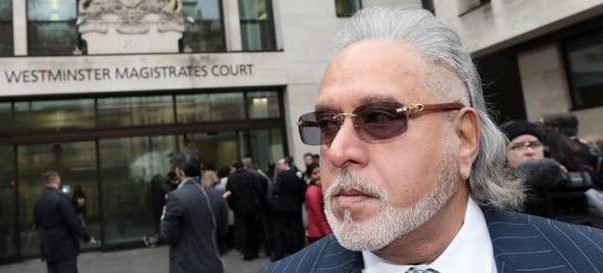London: Fugitive businessman Vijay Mallya suffered a major setback in his UK court battles after a British high court judge ruled on May 8 that an Indian judgment against him can legally be enforced against his assets in England and Wales. UK high court enforcement officers can now take legal steps to enforce the Indian judgment, which could include seizing and selling off Mallya’s assets in England and Wales. UK high court judge Andrew Henshaw QC handed down judgment in favor of a consortium of 13 state-owned Indian banks led by State Bank of India to which the former Chairman of UB Group owes more than Rs 9,000 core. Henshaw ruled the judgment dating January 19, 2017 of the Debt Recovery Tribunal (DRT), Karnataka, Bengaluru, which states that Mallya owes the banks Rs 6,203 crore plus interest (Rs 9,863 crore as of November 22, 2017), can now legally be registered in England. In his written judgment, Henshaw said: “There is a risk of the value of Dr Mallya’s assets deteriorating, and, or, being subject to claims by other creditors, and a risk of Dr Mallya being declared bankrupt. Dr Mallya’s departure from India, to where he has never since returned, and his resistance to India’s application to extradite him to face trial on serious criminal charges, provide some grounds for regarding him as a fugitive from justice.” On November 24, 2017 the banks had registered the judgment of the Indian DRT in the English courts and obtained a freeze order stating that Mallya cannot dispose of or diminish his worldwide assets up to the value of £1,145,000,000 (Rs 10,210 crore). But Mallya had applied to set the order registering the judgment aside and for the freeze order to be discharged. Paul Gair, partner at TLT, the UK law firm representing the banks, told TOI: “In dismissing Dr Mallya's application, the high court has demonstrated its willingness to recognize judgments granted by courts in other jurisdictions, giving parties opportunities to enforce their judgments against any assets held here. This case also sets a strong precedent for parties to secure a worldwide freezing order when enforcing judgments against willful defaulters. Following the decision on May 8, the banks are now considering the enforcement options available to them in order to recover the sums due from Dr Mallya under the DRT judgment, which is now enforceable in England and Wales as if it were a judgment given by the English courts.” Following the judgment, George Hayman QC, representing Mallya, sought permission to appeal against registering the Indian judgment in the UK on the grounds that the DRT judgment was “not sealed with a seal which shows that there is no upper limit on the pecuniary jurisdiction”, which he said was necessary for the judgment to be capable of registration as a judgment in England according to the Reciprocal Enforcement of Judgments (India) Order, 1958. He also argued that the letter sent in July 2017 from the DRT presiding officer to the UK high court confirming that the DRT had no upper limit on the pecuniary jurisdiction “could not be read with the DRT judgment together”. Asking for permission to appeal against the freeze order, Hayman added: “There is not anything to demonstrate risk of dissipation other than the sword and the sword is de minimums in the context of his whole assets,” he said, referring to a historic £188,400 sword once belonging to Tipu Sultan, which Mallya declared as an asset and then “gave away as it was bringing him bad luck”, in breach of asset restraining orders in India. Skeleton submissions by the banks’ lawyers also state that Mallya had disposed of one of the Maybach 62 cars and the Maybach 57 car and that he had failed to disclose a Porsche Cayenne (£70,000), a Range Rover (£60,000), a Ferrari F430 (£80,000), a Mini Cooper (£16,000) and a Bentley Turbo (£10,500), breaching the Supreme Court of India’s April 2016 disclosure order. Henshaw dismissed both applications by Mallya’s counsel to appeal and also refused to stay execution. Henshaw said there was “solid evidence of a real risk of dissipation of assets”, referring to Mallya’s transfer in February 2016 of $40 million received from Diageo to trusts for his three children and “giving away” the Tipu sword. In asking for costs Nigel Tozzi QC, representing the banks, said: “We know Vijay Mallya has secured a loan of £500,000 for his own costs in relation to this.” Mallya was ordered to pay £200,000 costs.
Vijay Mallya loses UK case, his England & Wales assets can be sold by Indian banks
- by Rinku
- May 08, 2018 2 minutes

Vijay Mallya











